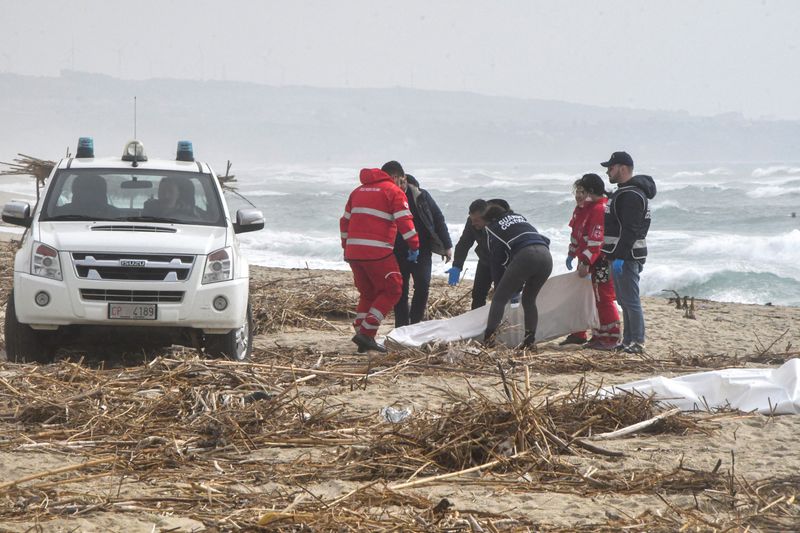By Gianni, Daniele and Alvise Armellini
ROME (Reuters) - At least 59 people died, including 12 children, when a wooden sailing boat carrying migrants to Europe crashed against rocks near the southern Italian coast early on Sunday, authorities said.
The vessel, which sailed from Turkey and was carrying people from Afghanistan, Iran and several other countries, sank in rough seas before dawn near Steccato di Cutro, a seaside resort on the eastern coast of Calabria.
The incident reopened a debate on migration in Europe and Italy, where the recently-elected right-wing government's tough new laws for migrant rescue charities have drawn criticism from the United Nations and others.
Manuela Curra, a provincial government official, told Reuters that 81 people had survived the shipwreck. Twenty of them were hospitalised, including one person in intensive care.
Interior Minister Matteo Piantedosi, who travelled to the scene, said 20-30 people might still be missing, amid reports from survivors that the boat had been carrying between 150 to 200 migrants.
The vessel set sail from the western Turkish port of Izmir about four days ago and was spotted about 74 km (46 miles) off the Italian coast late on Saturday by a plane operated by European Union border agency Frontex, Italian police said.
Patrol boats were sent to intercept it, but severe weather forced them to return to port, police said, adding that authorities then mobilised search units along the coastline.
A baby aged only a few months was among those found washed up on the beach, ANSA news agency said.
Emergency doctor Laura De Paoli described finding another dead child, aged seven.
"When we got to the point of the shipwreck we saw corpses floating everywhere and we rescued two men who were holding up a child. Sadly, the little one was dead," she told ANSA.
His voice cracking with emotion, Cutro's mayor, Antonio Ceraso, told the SkyTG24 news channel that he had seen "a spectacle that you would never want to see in your life ... a gruesome sight ... that stays with you for all your life".
Wreckage from the wooden gulet, a Turkish sailing boat, was strewn across a large stretch of coast.
One survivor was arrested on migrant trafficking charges, the Guardia di Finanza customs police said.
'FALSE PROSPECT' OF SAFETY
Italian Prime Minister Giorgia Meloni expressed deep sorrow for the deaths, and blamed human traffickers who profit while offering migrants "the false prospect of a safe journey".
"The government is committed to preventing departures, and with them the unfolding of these tragedies, and will continue to do so, first of all by calling for maximum cooperation from the countries of departure and of origin," she said.
Meloni's administration has said migrant rescue charities are encouraging migrants to make the dangerous sea journey to Italy, and sometimes work in partnership with traffickers.
Charities strongly reject both accusations.
"Stopping, blocking and hindering the work of NGOs (non-governmental organisations) will have only one effect: the death of vulnerable people left without help," Spanish migrant rescue charity Open Arms tweeted in reaction to Sunday's shipwreck.
However, the coast off Calabria has not been patrolled by NGO ships, which operate in the waters south of Sicily. That suggests they would have been unlikely to intercept the shipwrecked migrants regardless of Meloni's crackdown.
The head of the Italian Catholic Church, Cardinal Matteo Zuppi, called for the resumption of an EU search and rescue mission in the Mediterranean, as part of a "structural, shared and humanitarian response" to the migration crisis.
A spokesman for the United Nations' International Organization for Migration (IOM), in the same vein, appealed on Twitter for the strengthening of rescue operations in the Mediterranean.
Flavio Di Giacomo also called for the opening of "more regular migration channels" to Europe, and action to address what he said were the multiple causes pushing people to try the sea crossings.
Earlier on Sunday, Pope Francis, the son of Italian migrants to Argentina and long a vocal advocate for migrants' rights, said he was praying for the shipwreck's victims.

Italy is one of the main landing points for migrants trying to enter Europe by sea, with many seeking to travel on to richer northern European nations. But do to so, they must brave the world's most dangerous migration route.
The United Nations Missing Migrants Project has registered more than 20,000 deaths and disappearances in the central Mediterranean since 2014. More than 220 have died or disappeared this year, it estimates.
(Reporting from Rome by Alvise Armellini, Giselda Vagnoni, Angelo Amante, Crispian Balmer; Writing by Alvise Armellini; Editing by Tomasz Janowski, Crispian Balmer, Barbara Lewis and Frances Kerry)
